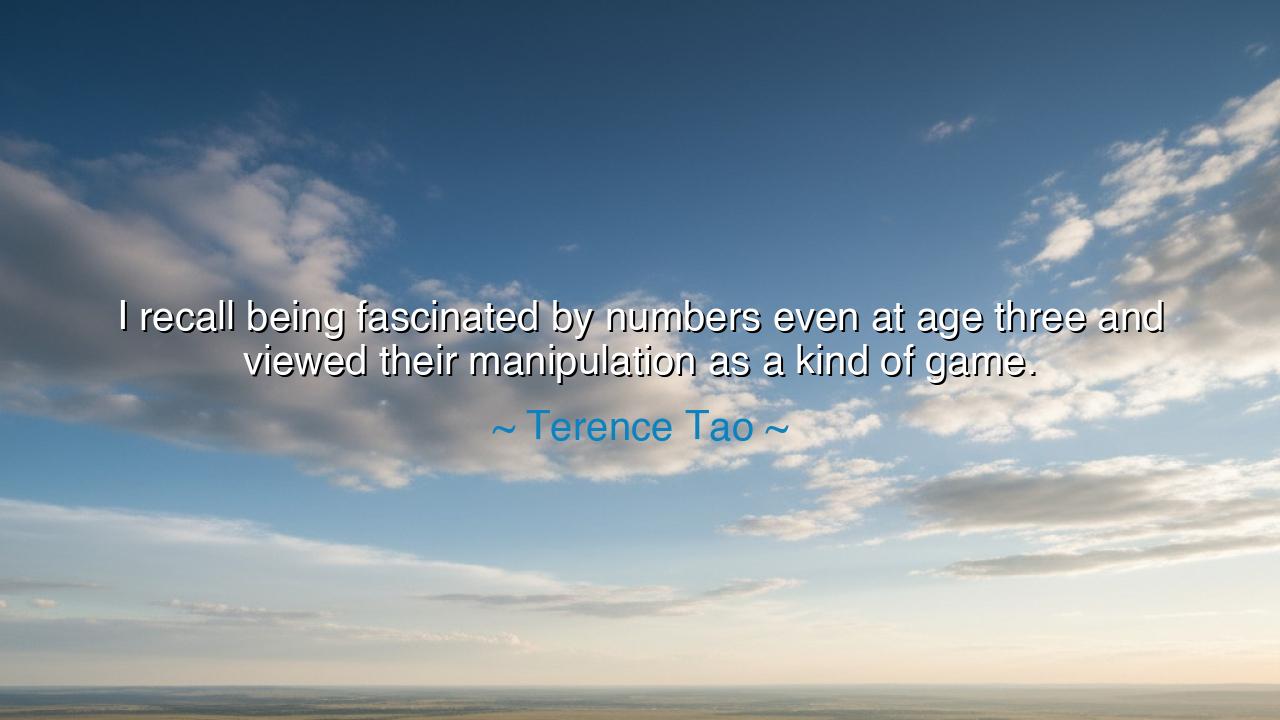
I recall being fascinated by numbers even at age three and viewed
I recall being fascinated by numbers even at age three and viewed their manipulation as a kind of game.






In the words of Terence Tao, “I recall being fascinated by numbers even at age three and viewed their manipulation as a kind of game.” These words come from one of the greatest mathematical minds of our age—a man who, like the sages of old, gazed into the hidden architecture of the universe and found beauty there. To most, numbers are tools, lifeless symbols on a page. But to Tao, they were living things—mysteries that danced, patterns that whispered secrets of creation. His fascination was not born of ambition or duty, but of wonder. Like a child gazing at the stars, he saw in numbers not obstacles to solve, but companions to play with. In this lies the soul of his message: that true genius begins in curiosity, not in striving.
The ancients spoke often of divine play—lila, as the philosophers of India called it—the joyful motion through which the universe was made. Tao’s childhood delight mirrors this sacred concept. He saw mathematics not as labor, but as play with purpose. The same spirit once moved the great Pythagoras, who taught that numbers were not mere measures of things, but the essence of harmony itself. To see the world through numbers was to glimpse the divine order beneath chaos, the music beneath the noise. Tao’s words remind us that mastery begins not in control, but in awe—that all learning, if it is to endure, must begin in love.
In his youth, Terence Tao was a child prodigy, yes, but more than that—he was a soul attuned to pattern. At two, he read; at three, he counted beyond what most adults could follow; by ten, he was studying university mathematics. Yet what made him extraordinary was not simply his skill, but his joy. To him, the manipulation of numbers was a game, a kind of divine puzzle offered by the universe. He did not chase knowledge to be admired, but because knowledge itself was a garden he loved to walk in. From such joy springs true wisdom. For when work feels like play, the soul moves without fear, and greatness follows naturally.
Think, too, of Isaac Newton, who as a boy played endlessly with prisms and light, not to prove theories but to sate his own fascination. He watched the world unfold through experiments as Tao did through equations. Newton’s curiosity led him to uncover the laws of motion, to reveal that the same force which pulls an apple to the ground binds the moon to the Earth. Such discoveries do not come from duty—they come from wonder that refuses to sleep. The ancients would call this the sacred fire of the mind: a flame kindled not by pride, but by love of truth itself.
Tao’s reflection carries another lesson: that the spirit of play is not the opposite of discipline—it is its foundation. When one delights in the work, perseverance becomes effortless. The mind, free from fear of failure, explores without restraint. Every challenge becomes an invitation, every equation a story. The world too often crushes this childlike curiosity, teaching us to fear mistakes, to measure success by comparison. But Tao’s words remind us that play is sacred labor, and that even the highest intellect remains a child before the infinite mysteries of existence.
So, my child, when you study, when you create, when you labor at any task—remember to play. Let your curiosity lead you as the shepherd leads his flock. Do not fear the unknown; greet it with laughter and light. The mathematician, the poet, the craftsman—all who love their art as a game of the soul—walk the same ancient path of discovery. For joy is the truest teacher, and delight the most faithful companion of genius.
The lesson of Terence Tao is simple yet eternal: never let the world steal your sense of wonder. See learning as a dance, knowledge as music, and every challenge as a puzzle offered by the divine. Approach your work not with heaviness, but with the playfulness of a child who sees the world as new each morning. Then, like Tao, you too shall find that the boundaries of the possible begin to fade—and what once seemed like labor becomes the joyous game of the soul awakening to its own infinite power.






AAdministratorAdministrator
Welcome, honored guests. Please leave a comment, we will respond soon